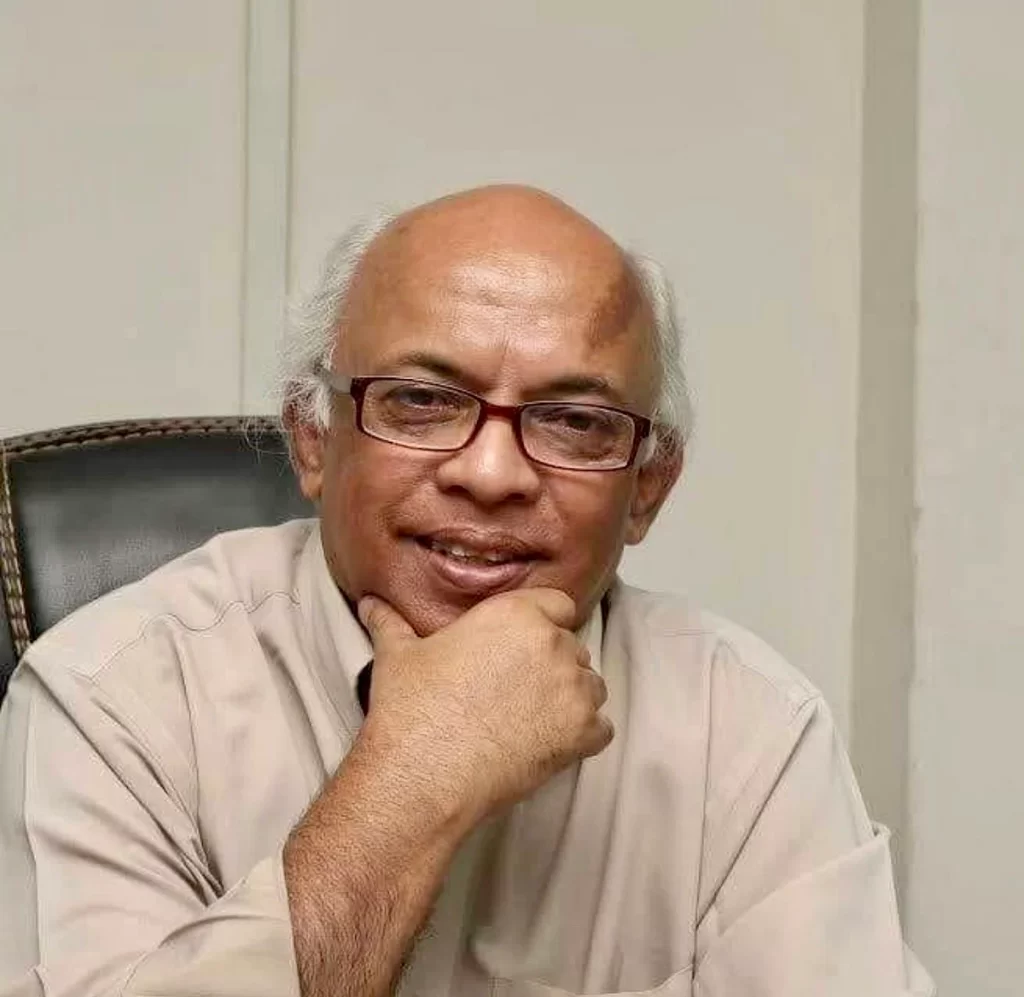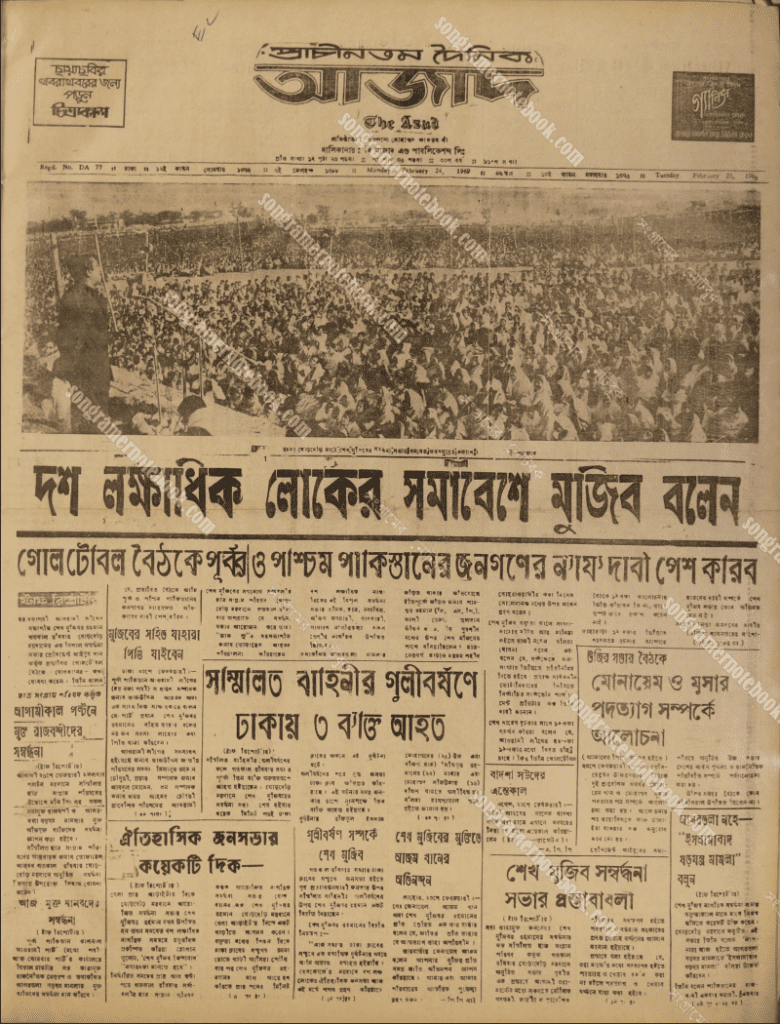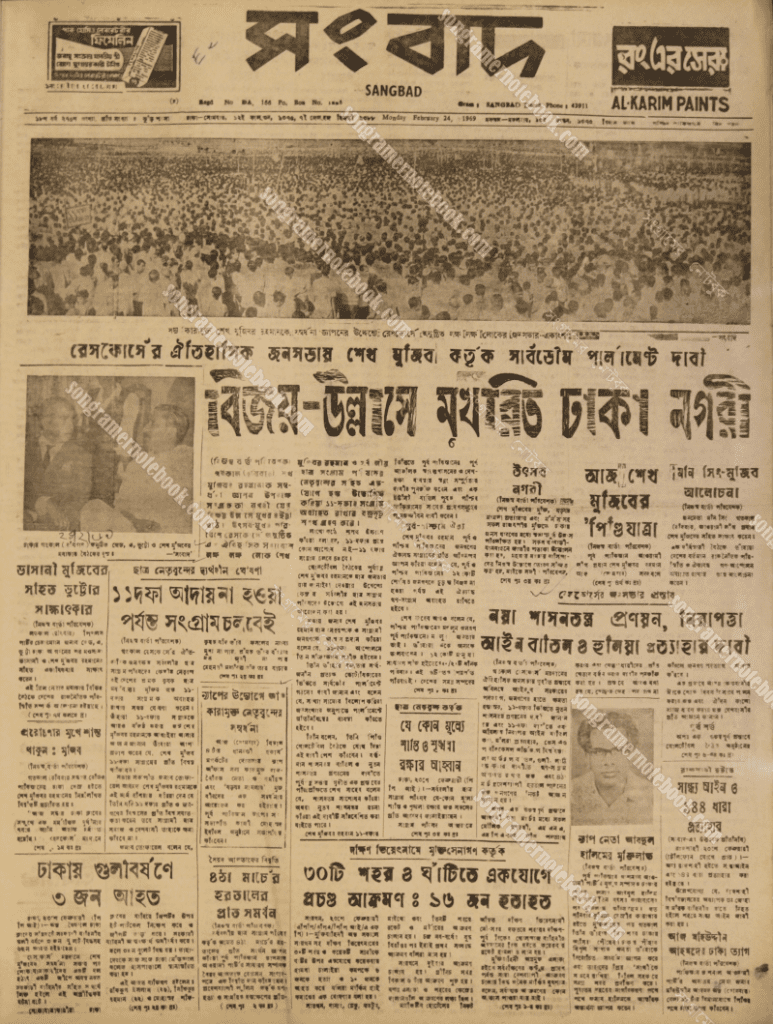On a recent talk show on one of the ubiquitous electronic media outlets in the country, a young politician currently aligned with the Bangladesh Nationalist Party in the anti-government agitation proffered some wrong or half-baked information about the Mass Upsurge of 1969. When one of his co-participants referred to the movement which was to force Field Marshal Ayub Khan from power in March 1969, this young politician said that the 1969 movement had been led by Moulana Abdul Hamid Khan Bhashani.
He was partially right, for between January and February 1969, Bhashani led a jalao-gherao movement which garnered the support of a large number of Bengalis. But it will not do to forget that in the gathering movement against the regime it was the students who, in defence of their eleven-point programme in alignment with the Awami League’s six-point plan, steered the movement toward a specific goal, that of a removal of the Ayub government from office. And there was too the Awami League which, with an entire Bengali nation, went into a concerted campaign for the withdrawal of the Agartala Conspiracy Case and the freeing of a yet-to-be Bangabandhu Sheikh Mujibur Rahman and his co-accused in the case.
It also needs to be recalled that the anti-Ayub movement at the time had been gathering pace in West Pakistan, with the Pakistan People’s Party, the National Awami Party and university students in Lahore, Karachi and Peshawar organising rallies demanding that the regime quit power. Z.A. Bhutto and Khan Abdul Wali Khan, like Bangabandhu, were in prison but eventually were released, as was Bangabandhu, in February 1969. To argue, therefore, that it was just Moulana Bhashani who spearheaded the Mass Upsurge is misleading and a misrepresentation of history.
Video Courtesy: Times of India (published in 2019)
There are a few other misconceptions which need to be cleared in the interest of history. Last week, a good number of Bengalis were cheered, on social media, by the fact that Bangladesh’s national anthem, Amar Shonar Bangla, was played in Lahore where a regional cricket series was going on. It was certainly a moment of pride for all of us, given that it rekindled memories of the dark period when the Pakistan occupation army in 1971, in its campaign of genocide, went all the way in trying to prevent us from singing Amar Shonar Bangla. And yet it was in Lahore that our cricketers stood in a state of patriotic emotion when the national anthem was played in that Pakistani city.

Amar Shonar Bangla, let us recapitulate history, was played — and that too by a Pakistan army band — in Pakistan for the first time when Bangabandhu Sheikh Mujibur Rahman and his delegation landed in Lahore on 23 February 1974 to participate in the summit of Islamic heads of government and state called by Pakistan’s Prime Minister Zulfikar Ali Bhutto. As Bangabandhu stood on the dais, flanked by Bhutto and Pakistan’s President Fazle Elahi Chaudhry, Pakistan’s soldiers played on. It was an entire song, penned by Rabindranath Tagore, that was played at Lahore airport. And among the Pakistani personalities waiting to be introduced to Bangabandhu was Tikka Khan, on whose orders Pakistan’s soldiers had fanned out on their killing mission in Dhaka on 25 March 1971. Tikka, at that point chief of staff of the Pakistan army, saluted Bangabandhu in what was a moment of cruel irony for the general.

There are other misconceptions related to history in our part of the world. For decades the statement that Henry Kissinger had described Bangladesh as a bottomless basket has been bandied about. The truth is that Kissinger never used that term. In fact, it was Under Secretary of State U. Alexis Johnson who, at a meeting of the Washington Special Action Group (WSAG) on 6 Dec 1971 (ten days before Bangladesh’s emergence as a sovereign state), stated that the new state ‘will be an international basket case.’ Kissinger’s response was: ‘But not necessarily our basket case’. He did not explain his comment. And, of course, Kissinger’s unhappiness at, even bitterness resulting from, the battlefield victory of the Bengalis is part of history. His role in Bangabandhu’s assassination has been commented on by the late writer Christopher Hitchens.
A statement attributed to Bhutto at the height of the political crisis in February-March 1971 is that he said at a public meeting in Karachi, ‘udhar tum idhar hum (you over there, me over here’), suggesting that he take power in West Pakistan and Bangabandhu take charge of East Pakistan. What Bhutto had actually said was that the December 1970 election had produced two majority parties, the Awami League in the east and the PPP in the west. He was cleverly giving a new spin to political definitions, of course. But an innovative reporter in an Urdu newspaper thought the phrase ‘udhar tum idhar hum’ captured Bhutto’s statement quite well. Years later, though, this journalist acknowledged that Bhutto had not used the term but that he, the journalist, had thought it up.
Finally, there is the historically significant photograph of Sher-e-Bangla AK Fazlul Huq administering the ministerial oath of office to a young Sheikh Mujibur Rahman in 1956. In most places where the picture is displayed, the information is wrongly given that Chief Minister Fazlul Huq is administering the oath. A Chief Minister or a Prime Minister does not swear in a minister. It is only a Governor or a President who does that. In this instance, it is Sher-e-Bangla, as Governor of East Pakistan, who happens to be administering the oath of office to Sheikh Mujibur Rahman prior to the latter’s joining the provincial cabinet as a minister. Please note that Sher-e-Bangla was Chief Minister of East Bengal for barely two months after the Jukto Front won the provincial elections in East Bengal in March 1954. The ministry was dismissed by the Karachi-based central government under Section 92-a in May.
History must deal with facts. Any deviation only leads to confusion, especially for those young whose interest in research is demonstrative of their interest in the making of history. Besides, there are those whose natural interest in historical happenings gets to be disturbed by wrong or misplaced interpretations of history. That ought not to be the case.
Cover Photo: A street child takes the lead of a procession during the Mass Uprising Movement in 1969. Police bullets killed the child soon after the photograph was taken by Rashid Talukder.
About the Author

Syed Badrul Ahsan is the Chief Editorial Adviser of The Confluence; a journalist and author. He previously served as the Press Minister at the High Commission of Bangladesh, London and authored a biography on the Founder of Bangladesh, Bangabandhu Sheikh Mujibur Rahman entitled From Rebel to Founding Father: Sheikh Mujibur Rahman



5 comments
That’s brilliant, Badrul bhai. True, something that we have been hearing for decades are not based on facts, rather circumstantial and the reporters or some observers made up those and started coining. And those became popular due to the context and flow of the incidents. Thank you so much for bringing up these and clearing the air.
Your simple thesis is famous historical facts – landmark political events are often misquoted and misattributed by certain political quarters according to their own volition to reap political benefits out of them. Sometimes they are never said at all but are, instead, little fables that have forged their way into public consciousness.
A new, meticulously researched simply untrue arrogates you have divulged here and tried to set the record straight on those untrue usurps that have crept into everyday use as signs of wisdom and wit, like Sigmund Freud’s sage advice that “sometimes a cigar is just a cigar.” (He didn’t quite say that, although his biographer thinks he would have approved of the idea.)
Showman P.T. Barnum never said “There’s a sucker born every minute” although he wished he had. And Civil War Admiral David Farragut probably never said “Damn the Torpedoes! Full Speed Ahead” — words that have inspired generations of fighting men.
To make things even more complicated, it is doubtful that Paul Revere warned that “The British are coming” when he would have at the time of the American Revolution thought himself British, although a revolting one. He probably would have said “The Redcoats are coming.”
Take, for example, “Damn the torpedoes! Full speed ahead,” a rallying cry supposedly uttered by Farragut during the American Civil War battle of Mobile Bay on August 5, 1864.
According to Fred R. Shapiro, a Yale librarian and editor of “The Yale Book of Quotations,” it was a comment either never said or at least never heard on the day of battle. The first appearance of a partial version of the phrase came in a book published in 1878 but reports from the day of the battle never mention the phrase.
No cigar! It can get “curiouser and curiouser,” to quote something Lewis Carroll actually did write. Gen. William T. Sherman did not quite say “War is hell” but those were words uttered by Napoleon Bonaparte.
Sherman’s version was a wee bit longer, “There is many a boy here today who looks on war as all glory, but boys it is all hell.” Close, but no cigar, as Groucho Marx might have said on his quiz show when someone failed to guess the colour of an orange correctly.
Showman Barnum admitted during his lifetime that he never said “There’s a sucker born every minute,” although he thought he may have said, “The people like to be humbugged,” a less than ringing phrase.
According to research by Shapiro, the “sucker” phrase was probably uttered by a notorious con man named “Paper Collar Joe” and attributed to Barnum by a rival showman, who wanted to make him look bad.
Those people deserve no power. They have no power. Employing a thorough, concise, and engaging style, this write-out provides readers with the best analysis of the “Mass Upsurge of 1969: Setting the Record Straight.” And thank you very much, Badrul bhai.
– Anwar Alam Khan, a direct witness of cruel birth of Bangladesh from a very close proximity in 1971 and a frontline FF of the 1971 war field
Lot of this should be in works archives and can be researched by young generation as well as interviews with those who witnessed in certain capacity ! A good PhD thesis for aspiring young Bangladeshi preferably in an overseas institution of repute to have the impartiality!
Youre so cool! I dont suppose Ive read anything in this way before. So nice to locate somebody by original thoughts on this subject. realy thanks for beginning this up. this fabulous website is one thing that is needed on the internet, a person with a bit of originality. beneficial project for bringing a new challenge towards internet!
[…] 1969 was a turning point. A couple of days after his release from incarceration, one that might have […]